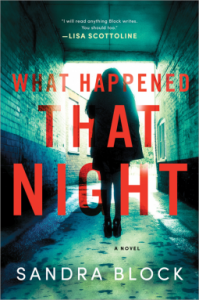
The thing about My Book Box, a subscription book service, is that whoever chooses books has a tendency to chose books I would bypass in a book store but actually love once I read them. It’s true that this has been more the rule for the non-fiction selections. The mystery selection is a bit more hit and miss. Not that the books are bad – they are more I could easily be just as happy as not reading them. But every so often the mystery book is something like Block’s work.
Honesty, this is something that if I saw in a bookstore, I might have picked it up, read the back, and walked off without it buying it. I would have written it off as a Lifetime movie, you know the one, where the woman discovers that her bestest girlfriend set her up to be raped. I hate Lifetime movies, so why would I want to read one?
But this book is not a Lifetime movie. To be fair, it does play with the idea of that trope, but it does something a bit different with it.
Dahlia was gang raped during college, she dropped out and now works as a paralegal. She has cut herself off from many things. The really good part of this book, and what Block does extremely well, is show us how Dahlia realizes that she is not as cut off as she thinks she is, how she has friends that she didn’t quite realize she had. This book has more than one positive woman/woman friendship and that is absolutely wonderful.
The book is also told from the perspective of James, a co-worker and romantic interest for Dahlia. He has his own set of issues, and to be honest, one of his reveals isn’t quite as hidden as the questions at the end of the book imply. But it to is an important and timely reason.
The book is about rape as well as the toxic masculinity that in some situations drives it. Block also deals with the question of mental illness, in particular depression, and she does it extremely well. The mental changes that both James and Dahlia go thorough are powerful, and I cannot describe the pleasure in reading a book that doesn’t treat the idea of going to therapy as something to be ashamed of or to be laughed at. She also illustrates how the process of determining to go to therapy works for some people.
In dealing with rape, Block also confronts the reaction of those to rape in a public setting, in particular with the use of social media accounts. It actually is a real examination of a variety of things that occur because of toxic masculinity. It’s a really good book.








